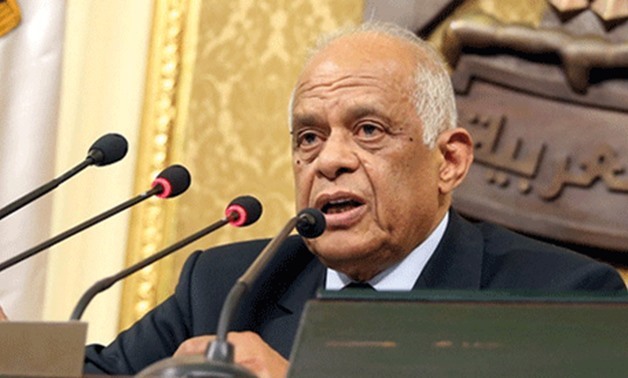
FILE – Parliament Speaker Ali Abdel Aal
CAIRO – 19 June 2018: The current Parliament’s session will conclude my mid-June without passing several draft laws; hence, they are set to be discussed in the next session in October.
Since the start of its third regular session on October 3, 2017, the House of Representatives has endorsed 111 draft laws and 32 international agreements.
The bills, draft laws and agreements aimed to upgrade the different sectors in Egypt and improve the lives of citizens. Among the top sectors addressed during the past few months since October are: health care, supporting workers and youth rights, countering corruption and easing investment measures, said spokesman for the Parliament Salah Hassaballah in a press conference on May 29.
The new traffic draft law
The traffic law is still being discussed by the concerned committees as members of Parliament stressed that the law needs to be considered carefully; it will be postponed to the next session.
The Egyptian government approved on October 18, 2017, the new traffic draft law.
This law is expected to contribute to reducing the frequency of fatal road accidents, avoiding traffic errors in large cities, and extending penalties for violations of the law.
The new law suggests establishing a points system. The license holder will be given 50 points; with each violation he/she loses a point or more.
When all points are deducted, the driver’s license is suspended for 30 days. To get the license back, the driver must enroll in an accredited driving school to learn more about the traffic laws.
Upon exceeding the speed limit, there are four penalties depending on the speed. The maximum fine is LE 500 ($28), and the driver would lose 2-5 points as a penalty.
In case of using speed camera detectors, the driver loses 5 points as a penalty, in addition to the fine.
All drivers will be exposed to a substance abuse detection test before taking the driving license. If the driver is proved to be a drug user, he will be deprived from the license permanently, according to a security source.
Under the draft law, the drivers must pass a training course to learn the basics of safe driving in one of the driving schools accredited by the General Directorate of Traffic.
Labor draft law
The new labor law is important because it achieves a significant guarantee for nearly 26 million laborers working in the private sector and non-governmental organizations (NGOs); it provides them with security and preserves their rights. The bill guarantees resignation will not be accredited unless the Manpower Ministry approves and there will be no dismissal without a court verdict.
The law encourages young people to work in the private sector and maximizes their role in promoting the national economy. It also provides a safe environment for laborers through a clear contract between them and the employer.
The bill will include the creation of new labor courts to speed-up litigation processes. It provides the opportunity for better training and education, ensuring the rights of working women and people with special needs.
Additionally, women working in the private sector will be granted the right to a four-month maternity leave like those working in the public sector, in accordance with the Civil Service Law. This leave shall be granted twice during a woman's period of service.
The bill guarantees that the daily working hours of pregnant women shall be reduced by at least one hour starting from the sixth month of pregnancy. Moreover, no additional working hours shall be allowed for women during their pregnancy period and the six months following the childbirth.
New Personal status draft law
The draft law is among the priorities of the next Parliament’s session as it tackles different aspects of social issues, such as divorce cases, and regularizes the situation between family members in the case of divorce in a way that works for the best interest of children.
The draft law has been criticized; hence, the Parliament’s Legislative Committee will hold hearings with counselors, lawyers and employees in family courts, in addition to hearings with families affected by the current Personal Status Law in collaboration with the concerned civil organizations, to amend the current law.

Comments
Leave a Comment